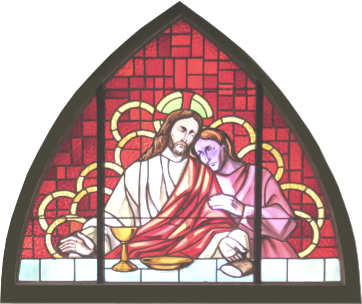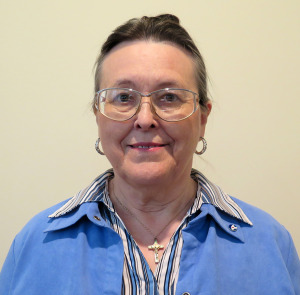The True Presence of Jesus in the Holy Eucharist
Written by Lorraine Vincent
September 22, 2014
Download a printable pdf version
Our beautiful Roman Catholic Church was named in honour of the Most Blessed Sacrament of the Eucharist. In Blessed Sacrament Church, shining above the altar, is a beautiful, large, circular, stained glass window. It depicts twelve petals of a flower around the central Blessed Sacrament, the Body and Blood of Jesus Christ. The twelve petals surrounding the Eucharist represent the twelve apostles of Christ of our apostolic Catholic Church.
The Holy Eucharist is the source and summit of Catholic life. It is at the center of life of the Catholic Church. It is the “Sacrament of sacraments” (Catechism of the Catholic Church, CCC, 1211), for in this Blessed Sacrament is Christ Himself. In Redemptor Hominis Saint John Paul II wrote, “It [the Blessed Sacrament] is at one and the same time a Sacrifice-Sacrament, a Communion-Sacrament, and a Presence-Sacrament.”
Jesus instituted the Blessed Sacrament at the Last Supper, the night before He died for us on the Cross to save us from our sins. To emphasize the significance of Jesus’ institution of the Eucharist is the fact that all four Gospels in the Bible have that Last Supper account—a significant point. The scripture references for them are Matthew 26:26-28, Mark 14:22-24 and Luke 22:19-20 and John 13:1-38.
In Luke 22:19-20 it is written, “And He took bread, and when He had given thanks He broke it and gave it to them, saying, ‘This is My Body which is given for you. Do this in remembrance of Me.’ And likewise the cup after supper, saying, ‘This cup which is poured out for you is the new covenant in My Blood.’” Christ wanted to remain present to His Church in this unique way, in the Blessed Sacrament, to the end of time.
St. Faustina Kowalska (1905-1938), who was canonized by St. John Paul II in the year 2000, wrote in her diary, Divine Mercy in My Soul, that Jesus said to her, “I want to tell you that eternal life must begin already here on earth through Holy Communion. Each Holy Communion makes you more capable of communing with God throughout eternity” (Diary, 1811).
Jesus said to His disciples and apostles: “ ‘I am the living Bread that came down from Heaven. … Those who eat My Flesh and drink My Blood have eternal life, and I will raise them up on the last day; for My Flesh is true food and My Blood is true drink. Those who eat My Flesh and drink My Blood abide in Me, and I in them. Just as the living Father sent Me, and I live because of the Father, so whoever eats Me will live because of Me.’ … Because of this many of His disciples turned back and no longer went about with Him. So Jesus asked the twelve, ‘Do you also wish to go away?’ Simon Peter answered Him, ‘Lord, to whom can we go? You have the words of eternal life. We have come to believe and know that You are the Holy One of God.’ ” (John 6:51,54-57,66-69).
Notice that when many of His disciples left, shocked by what He said, Jesus did not call them back saying that He really did not mean that people would really eat Him. He did not change His statement, because He spoke the truth. St. Peter proclaimed that Jesus is the Son of God; and in faith, St. Peter believed, even though he could not fully understand.
Even though we cannot fully understand how Jesus is truly present and alive in the Holy Eucharist—the Bread and Wine consecrated at the Holy Sacrifice of the Mass by a Catholic priest, we, like St. Peter must have faith. We must trust in Jesus and in His teachings in His Church, the Holy Catholic Church. He came down from Heaven for us. Each person who receives and consumes the consecrated Host, receives Jesus, alive in His Body, Blood, Soul and Divinity.
St. Faustina Kowalska wrote in her diary, “I saw the Lord Jesus, exposed in the monstrance. In place of the monstrance, I saw the glorious face of the Lord, and He said to me, “What you see in reality, these souls see through faith. Oh, how pleasing to Me is their great faith! You see, although there appears to be no trace of life in Me, in reality it is present in its fullness in each and every Host. But for Me to be able to act upon a soul [bestowing graces], the soul must have faith. O how pleasing to Me is living faith!” (Diary, 1420).
“That in this sacrament are the true Body of Christ and His true Blood is something that ‘cannot be apprehended by the senses,’ says St. Thomas [Aquinas], ‘but only by faith, which relies on divine authority.’ For this reason, in a commentary on Luke 22:19 (‘This is My Body which is given for you.’), St. Cyril [of Alexandria] says: ‘Do not doubt the Saviour in faith, for since He is the truth, He cannot lie.’ ” (CCC, 1381).
St. Faustina Kowalska wrote that one day the knowledge of her sins caused her grief, and at Holy Mass she did not receive the Holy Eucharist. “Once I desired very much to receive Holy Communion, but I had a certain doubt, and I did not go. I suffered greatly because of this. It seemed to me that my heart would burst from the pain. When I set about my work, my heart full of bitterness, Jesus suddenly stood by me and said, “My daughter, do not omit Holy Communion unless you know well that your fall was serious [then the Sacrament of Reconciliation is necessary]; apart from this, no doubt must stop you from uniting yourself with Me in the mystery of My love” (Diary, 156; also see Diary, 612, & 1611).
Therefore, if Catholics are aware of a very serious sin, a mortal sin, it is absolutely necessary to go to confession to a Catholic priest to receive the Sacrament of Reconciliation, before receiving Holy Communion.
In this regard, St. Faustina Kowalska wrote, “I saw how unwillingly the Lord Jesus came to certain souls in Holy Communion. And He spoke these words to me: “I enter into certain hearts as into a second Passion” (Diary, 1598). “Today I learned with what aversion the Lord comes to a certain soul in Holy Communion. He goes to that heart as to a dark prison, to undergo torture and affliction. I kept begging His pardon and offering atonement for the offense” (Diary, 1280).
When a sinner goes to confession to a Catholic priest to receive the Sacrament of Reconciliation, with complete contrition and determination not to commit that mortal sin again, their soul is completely wiped clean of sin by the grace of God. Then if this cleansed soul has faith in the true presence of Jesus in the Holy Eucharist, Jesus will be pleased to enter that soul in Holy Communion bestowing His graces.
In John 13:1-38, St. John’s Last Supper account, St. John provides a fundamental understanding of the Last Supper Event which is very important. During the Last Supper, Jesus washed the feet of all the apostles. St. Peter objected. He didn’t want Jesus, his Teacher and Lord, to be so humble as to bend and wash their feet. But Jesus insisted. “When He had washed their feet, and taken His garments, and resumed His place, He said to them, ‘Do you know what I have done to you? You call me Teacher and Lord; and you are right, for so I am. If I then, your Lord and Teacher, have washed your feet, you also ought to wash one another’s feet. For I have given you an example, that you also should do as I have done to you. Truly, truly, I say to you, a servant is not greater than his Master [Jesus]; nor is He who is sent greater than He [the Father] who sent Him. If you know these things, blessed are you if you do them’” (John 13:12-17).
We also, must put into practice the words of Jesus. After receiving the Lord in Holy Communion we are told to go and be Eucharist for those whose lives we touch—to be Christ’s real presence in the world we live in—to bring Him to those whose lives we encounter. Jesus points out how union with Him requires humble and charitable acts. Therefore, united with Jesus in the Holy Eucharist we must go forth and be the Body of Christ to others, serving and loving our neighbour, by doing what Jesus would do. He helped the sick, the handicapped and the poor. He also spoke to people, explaining the Ten Commandments, teaching them about the true faith and trying to convert them. As Catholics, even if we are under attack, we must speak the truth about our Catholic faith, and about the True Presence of Jesus in the Eucharist, the soul essence of our Church. We are the Body of Christ here on Earth. Therefore, service, self-giving love and Stewardship are essential values to be lived for any person who claims to be a sincere and genuine disciple of Christ.
With faith in Jesus, and His True Presence in the Holy Eucharist, we should try to make time to worship Him in Eucharistic Adoration: to sit and pray in front of the Tabernacle where Jesus is present, or pray before the Host exposed in the monstrance. We can come early before the Holy Sacrifice of the Mass or stay after Mass for awhile. We can offer our sufferings and sorrows to Jesus, to be joined to His Holy Passion for ourselves and for souls—for all sinners.
At our Blessed Sacrament Church, Eucharistic Adoration is available every day of the week before every Mass. We are indeed blessed to have this opportunity. Saint John Paul II stated in Domicae cenae, 3: “The Church and the world have a great need for Eucharistic worship. Jesus awaits us in this sacrament of love. Let us not refuse the time to go to meet Him in adoration, in contemplation full of faith, and open to making amends for the serious offenses and crimes of the world. Let our adoration never cease.”

